Feeding the “Least of These My Brethren”
The Church donated $44 million to promote childhood nutrition and bless nearly two million lives in 30 countries.
February 2020
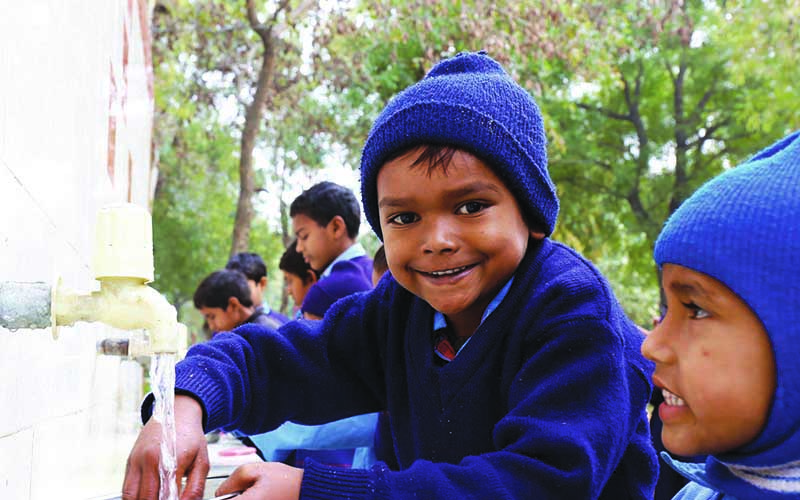
The Church of Jesus Christ of Latter-day Saints works with local leaders and organizations who align with the Church’s mission and have proven successful in their humanitarian efforts. We work with organizations of all sizes, from global nongovernmental organizations (NGOs) and government ministries to local nonprofits. By collaborating with organizations that have sustainable local solutions to local needs, we can ensure that the Church’s resources, including donations to the Humanitarian Aid Fund, are being used appropriately. By working with us, collaborating organizations can increase their impact through our funding and volunteer resources. Since 1985 we have partnered with more than 15,000 community, regional, and global partners.
Clean water is one of the major initiatives supported by The Church of Jesus Christ of Latter-day Saints. With generous donations to the Church’s Humanitarian Aid Fund, we reach more than a million people from all faiths, countries, and ethnicities each year as we help communities implement the three pillars of health: clean water sources, improved sanitation facilities, and proper hygiene training. We recently provided support to WaterAid, an organization on a mission to transform lives by improving access to clean water, hygiene, and sanitation in the world’s poorest communities.
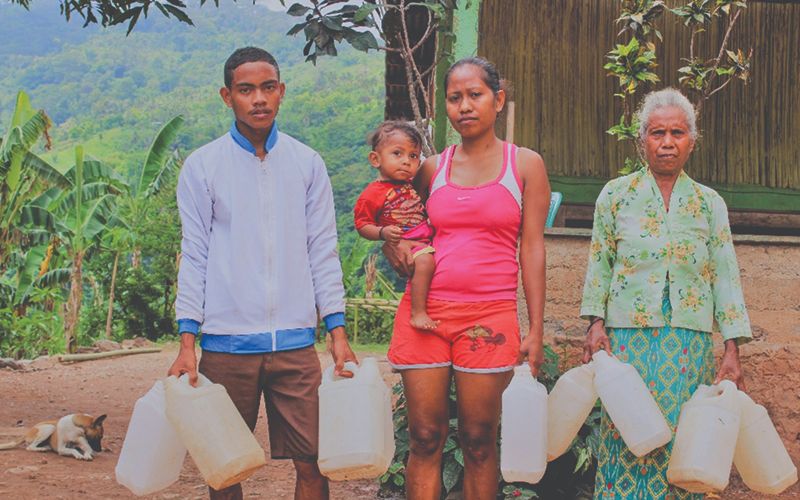 Elvira dos Santos da Cruz and her family collect water in Leb Metan B village, Liquiçá. (Photo courtesy of WaterAid)
Elvira dos Santos da Cruz and her family collect water in Leb Metan B village, Liquiçá. (Photo courtesy of WaterAid)At the successful conclusion of its yearlong project, Increasing Access to Improved Water, Sanitation, and Hygiene Services (WASH) in Timor-Leste, WaterAid and its partners have established the foundation to ensure the sustainability of WASH services in four remote communities in the Liquiçá and Manufahi districts of Timor-Leste.
With funding from The Church of Jesus Christ of Latter-day Saints, WaterAid reached a total of 4,583 direct and indirect beneficiaries (or 181 percent of its project target) in 12 months. WaterAid and its partners reached 638 people with access to safe drinking water, improved sanitation, and hygiene promotion. And 3,700 people also benefited from follow-up and support visits by the district water user group associations and district government joint sustainability monitoring. WaterAid and its partners have successfully implemented planned project activities and worked to ensure the sustainability of WASH services in the four communities. As a result, these communities are now able to operate and manage water supply services by themselves.
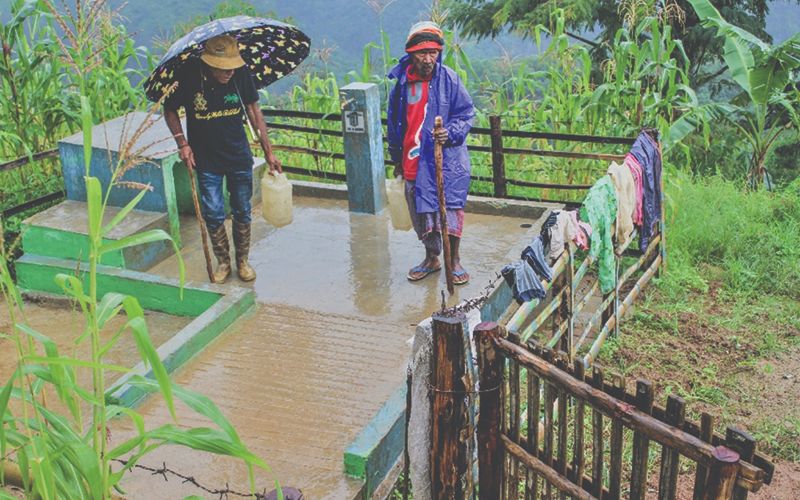 Domingos de Jesus (right) collects water from the new tap stand in Fanlelo village, Manufahi. (Photo courtesy of WaterAid)
Domingos de Jesus (right) collects water from the new tap stand in Fanlelo village, Manufahi. (Photo courtesy of WaterAid)Elvira dos Santos da Cruz lives with her family in Leb Metan B, a rural village in Liquiçá. “My family and I often walk for one to two hours to a river, which is the only available water for cooking,” she says. “But we can’t use the river during the rainy season because the water is too muddy. It takes up to a week before we can use the river water again, due to contamination. Instead, we use rainwater during the rainy season, which some-times makes my children sick. I can’t stand seeing my children get diarrhea and other waterborne diseases caused by dirty water, which is the only water available to us. I am grateful that WaterAid chose our village for intervention and plans to install water systems in our community. Having a tap stand near our home will change so many things in our lives for the better, particularly our health. My children will be healthier. To me, that’s the most important thing, since it takes us two hours to walk to the main road to access public transportation to the hospital when my children fall ill.”
Domingos de Jesus, 72, lives in Fanlelo village, one of the most remote areas of Manufahi municipality. “As a person with a disability, I faced many challenges before WaterAid built a tap stand in my village,” he says. “I had to borrow clean drinking water from my neighbors, and when my grand-children came home, I asked them to immediately go and refill empty water containers for me. Sometimes, I managed to walk to the water source myself even though it took me several hours due to my disability. Now, I am so grateful that I no longer need to walk long distances or borrow my neighbors’ water for cooking.”
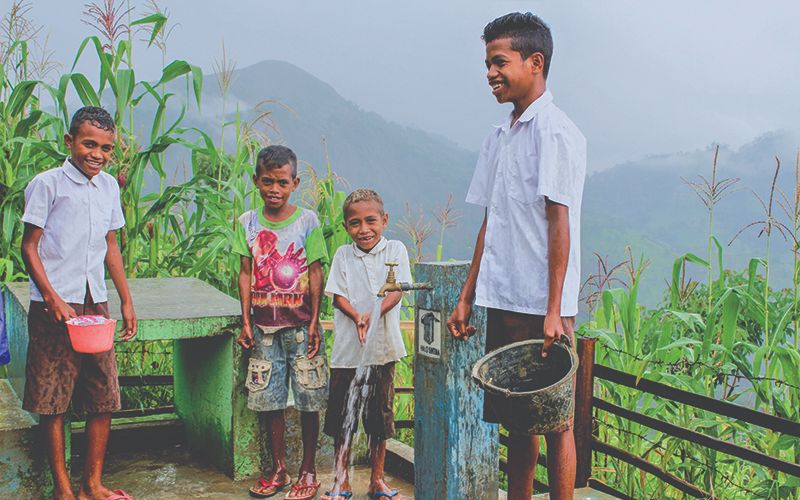 Guilermino (left) collects water with his friends from the new tap stand in Fanlelo village, Manufahi. (Photo courtesy of WaterAid)
Guilermino (left) collects water with his friends from the new tap stand in Fanlelo village, Manufahi. (Photo courtesy of WaterAid)Guilermino, 11, lives in Fanlelo, Manufahi. Before WaterAid built a tap stand in his village, Guilermino and his friends did not have access to clean water. With the nearest water source located approximately 2 kilometers from his home, Guilermino and his mother had to walk two to three hours to collect water, usually before and after school. Holding his water container, he says, “I am so grateful. Now my family and friends have clean water near our homes, and we can spend more time learning and playing.”
Sandiara, 15, brushes her teeth with water from the partially completed piped system in Blaro B village in Manufahi. “I was always late for school because I had to walk long distances to collect water with my mom,” she says. “We need to pre-pare food for my dad and siblings every morning. I also used the opportunity to bathe in the river.
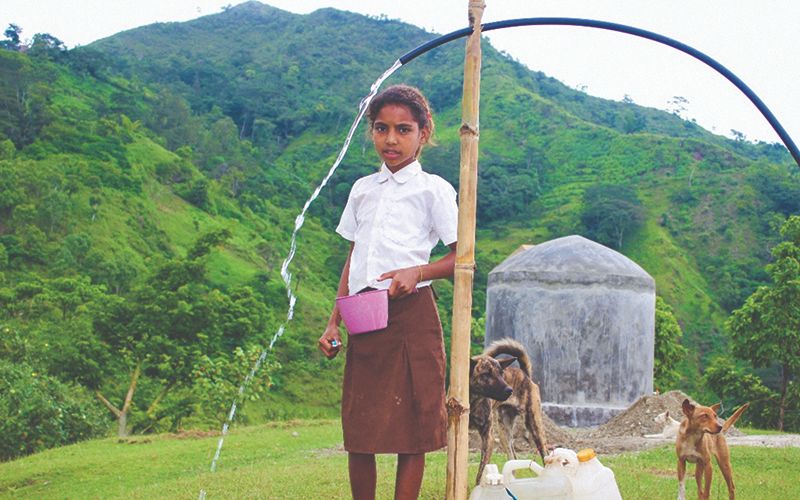 Sandiara stands in front of a newly installed piped water system in Blaro B, Manufahi. (Photo courtesy of WaterAid)
Sandiara stands in front of a newly installed piped water system in Blaro B, Manufahi. (Photo courtesy of WaterAid)-------------------------
A Note from Blaine Maxfield, Managing Director, Welfare and Self-Reliance Services Department
What an incredible opportunity we have to participate in one of the primary missions of the Church—to care for the poor and those in need. This year you have helped us accomplish so much, from working to eliminate maternal and neonatal tetanus in South Sudan to providing vital water, sanitation, and hygiene services in Yemen. Your donations are considered sacred to us, so every dollar that we spend is maximized to make the biggest impact. We collaborate with proven and trusted organizations around the globe, and our close relationships ensure that the support you give makes an impact down the line. As we work together with other global humanitarian leaders, we multiply your efforts to feed the hungry, give drink to the thirsty, take in the stranger, clothe the naked, and visit the sick and afflicted. Together, we are developing divine connections and becoming more like our Savior as we do His work of caring for others. You are blessing His children, and we are so grateful for each and every donation.
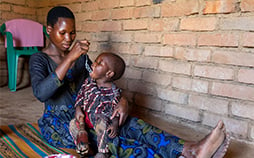
The Church donated $44 million to promote childhood nutrition and bless nearly two million lives in 30 countries.
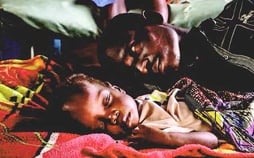
Children like Pierre, receive lifesaving aid through your donations that help buy things like Plumpy’Nut, a ready-to-use therapeutic food.
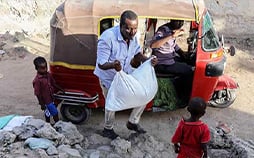
Donations to the Humanitarian Aid Fund are helping World Food Programme Somalia ensure that 35,323 schoolchildren have five months of nutritious food.